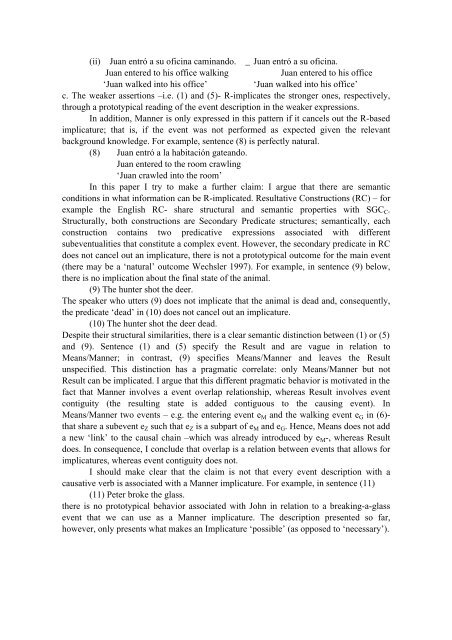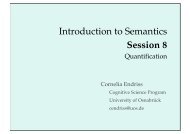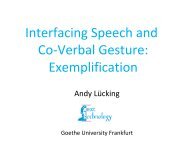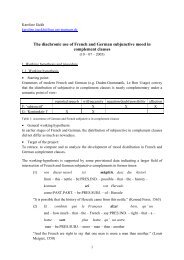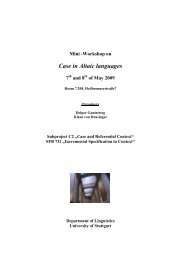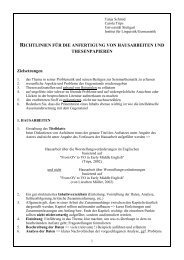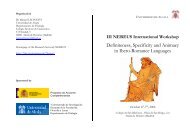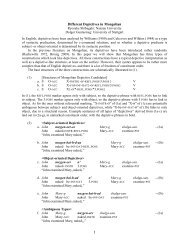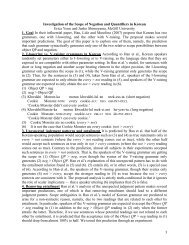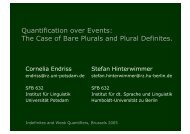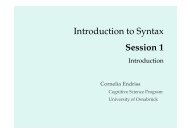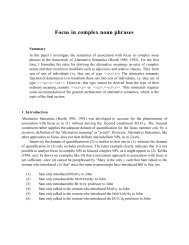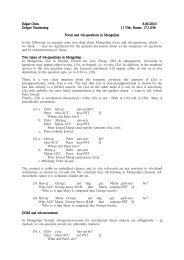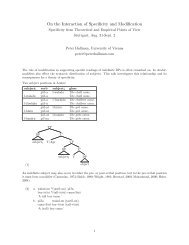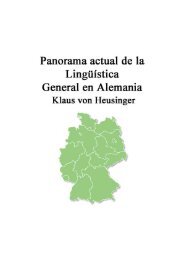SemPrag03.Progr.pdf - Institut für Linguistik/Germanistik - Universität ...
SemPrag03.Progr.pdf - Institut für Linguistik/Germanistik - Universität ...
SemPrag03.Progr.pdf - Institut für Linguistik/Germanistik - Universität ...
Create successful ePaper yourself
Turn your PDF publications into a flip-book with our unique Google optimized e-Paper software.
(ii) Juan entró a su oficina caminando. _ Juan entró a su oficina.<br />
Juan entered to his office walking<br />
Juan entered to his office<br />
‘Juan walked into his office’<br />
‘Juan walked into his office’<br />
c. The weaker assertions –i.e. (1) and (5)- R-implicates the stronger ones, respectively,<br />
through a prototypical reading of the event description in the weaker expressions.<br />
In addition, Manner is only expressed in this pattern if it cancels out the R-based<br />
implicature; that is, if the event was not performed as expected given the relevant<br />
background knowledge. For example, sentence (8) is perfectly natural.<br />
(8) Juan entró a la habitación gateando.<br />
Juan entered to the room crawling<br />
‘Juan crawled into the room’<br />
In this paper I try to make a further claim: I argue that there are semantic<br />
conditions in what information can be R-implicated. Resultative Constructions (RC) – for<br />
example the English RC- share structural and semantic properties with SGC C .<br />
Structurally, both constructions are Secondary Predicate structures; semantically, each<br />
construction contains two predicative expressions associated with different<br />
subeventualities that constitute a complex event. However, the secondary predicate in RC<br />
does not cancel out an implicature, there is not a prototypical outcome for the main event<br />
(there may be a ‘natural’ outcome Wechsler 1997). For example, in sentence (9) below,<br />
there is no implication about the final state of the animal.<br />
(9) The hunter shot the deer.<br />
The speaker who utters (9) does not implicate that the animal is dead and, consequently,<br />
the predicate ‘dead’ in (10) does not cancel out an implicature.<br />
(10) The hunter shot the deer dead.<br />
Despite their structural similarities, there is a clear semantic distinction between (1) or (5)<br />
and (9). Sentence (1) and (5) specify the Result and are vague in relation to<br />
Means/Manner; in contrast, (9) specifies Means/Manner and leaves the Result<br />
unspecified. This distinction has a pragmatic correlate: only Means/Manner but not<br />
Result can be implicated. I argue that this different pragmatic behavior is motivated in the<br />
fact that Manner involves a event overlap relationship, whereas Result involves event<br />
contiguity (the resulting state is added contiguous to the causing event). In<br />
Means/Manner two events – e.g. the entering event e M and the walking event e G in (6)-<br />
that share a subevent e Z such that e Z is a subpart of e M and e G . Hence, Means does not add<br />
a new ‘link’ to the causal chain –which was already introduced by e M -, whereas Result<br />
does. In consequence, I conclude that overlap is a relation between events that allows for<br />
implicatures, whereas event contiguity does not.<br />
I should make clear that the claim is not that every event description with a<br />
causative verb is associated with a Manner implicature. For example, in sentence (11)<br />
(11) Peter broke the glass.<br />
there is no prototypical behavior associated with John in relation to a breaking-a-glass<br />
event that we can use as a Manner implicature. The description presented so far,<br />
however, only presents what makes an Implicature ‘possible’ (as opposed to ‘necessary’).


